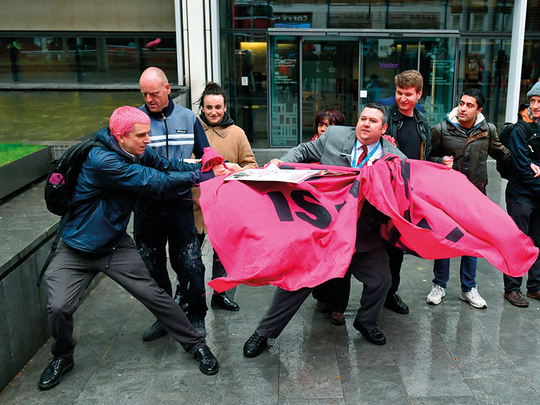
London: Ministers have moved swiftly to try to protect Theresa May following the dramatic resignation of Amber Rudd, insisting the home secretary resigned only because she inadvertently misled MPs, and not because of the wider Windrush scandal.
With the prime minister set to announce a replacement later on Monday, amid another forced cabinet rejig, the transport secretary, Chris Grayling, rejected the idea that May was facing pressure over her own position.
“This is about sorting out a problem,” he told Sky News. “The prime minister has apologised to these people, and we’re going to get on with the job of fixing it.”
The home secretary announced she was stepping down on Sunday after a series of revelations in the Guardian over Windrush culminated in a leak that appeared to show she was aware of targets for removing illegal migrants from Britain.
The pressure increased on Sunday afternoon as the Guardian revealed that in a leaked 2017 letter to Theresa May, Rudd had told the prime minister of her intention to increase deportations by 10 per cent — seemingly at odds with her recent denials that she was aware of deportation targets.
Rudd was facing a bruising appearance in the House of Commons on Monday, having to explain yet again why she told the home affairs committee last week that she did not know of any deportation targets.
Grayling said Rudd had spoken “in good faith” and had stepped down because “she had inadvertently misled parliament, that she should have known a bit more about the issue of targets”.
He added: “It doesn’t often happen in politics, and people criticise when it doesn’t happen. What we’ve got here is a former home secretary who acted on principle.”
Grayling insisted her departure had nothing to do with the wider issue of members of the Windrush generation of arrivals from the Caribbean being wrongly targeted by immigration authorities, or the so-called hostile environment immigration policy.
“The Windrush issue is something we all regret,” he said. “It’s a mistake, the government’s apologised, the prime minister has apologised, the former home secretary apologised for it. That isn’t the issue that led to her resignation. The issue is about her inadvertently misleading the house in good faith.”
The shadow home secretary, Diane Abbott, disputed this, and said May should come to the Commons to explain herself to MPs.
“Fundamentally, the reason she had to resign was because of the Windrush fiasco,” Abbott told BBC Radio 4’s Today programme. “Somebody had to take responsibility. It happened on her watch, therefore I think it’s right she has resigned.”
On May addressing MPs, Abbott said: “In the first instance we’d like to know if she herself knew about the targets and would therefore be in a position to say whether Amber Rudd misled the house.
“More fundamentally, we want to talk to her about the aspects of the so-called hostile environment, which she was responsible for, and led to the Windrush fiasco.”
In her resignation letter to the prime minister, published hours after the latest leak, Rudd said she had “become aware of information provided to my office which makes mention of targets. I should have been aware of this, and I take full responsibility that I was not.”
The prime minister replied that she believed Rudd had given her evidence “in good faith”; but that she could “understand why, now you have had chance to review the advice that you have received on this issue, you have made the decision you have made, and taken responsibility for inadvertently misleading the home affairs select committee”.
May added that Rudd had led her department with “great integrity, compassion and selflessness — notwithstanding the personal and political challenges you have faced during this period”.
May is expected to announce Rudd’s replacement on Monday, with potential candidates including the communities minister, Sajid Javid, who spoke out strongly over Windrush in an interview at the weekend; and the Cabinet Office minister, David Lidington, who has become a trusted ally since taking over from Damian Green.
The process that led to Rudd’s departure began on Wednesday when the Labour MP Yvette Cooper challenged her repeatedly about removals targets at the home affairs select committee, prompting Rudd to insist “that’s not how we operate”.
The next day, she pledged to scrap future targets, saying, “I have not approved or seen or cleared any targets for removals looking ahead, and looking ahead I will not be doing that” — and said she would change the culture of the home office from top to bottom, insisting, “I can do this.”
Former ministerial colleagues paid tribute to Rudd and expressed the hope she would return. “I hope she’ll be back,” the education secretary, Damian Hinds, told Today.
The health secretary, Jeremy Hunt, said Rudd would “be missed until she is back which she will be”.











